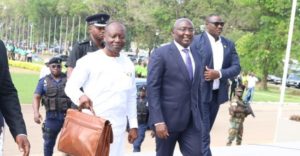
Accra, Ghana, June 15, 2019//-The World Bank has warned Ghana that its recent financial sector clean-up will undermine progress made with fiscal consolidation, if domestic revenue mobilization continues to be weak.
In its latest fourth edition of the Ghana Economic Update report launched in Accra on Friday 14, July 2019, it warned: “Fiscal consolidation is expected to slow in 2019 largely to the financial sector clean-up but to remain intact over the medium term”.
The outgoing World Bank Country Director for Ghana, Liberia and Sierra Leone, Henry Kerali who performed the launch added: “Addressing the remaining vulnerabilities in the financial sector is urgent and will require additional efforts in 2019”.
Senior Economist and co-author of the report, Michael Geiger maintained: “An effective domestic revenue mobilization strategy is an urgent priority as the reduction of expenditures, including public investment, in response to revenue underperformances may not be sustainable”.
“The next election cycle in 2020 will be an important test for fiscal sustainability”.
Increased weaknesses in the country’s financial sector over the past years resulted in the authorities closing nine domestically owned universal banks between 2017 and 2018. While over 347 microfinance companies and 39 microcredit companies operating in the country were closed by the Bank of Ghana on 31st May 2019.
To this end, the government is providing sustainable fiscal support to cover the gap between the liabilities and assets.
Senior Financial Sector Specialist and co-author of the report, Carlos Vicente, argued: “It is encouraging to note that the authorities are strengthening supervision including through enforcement of prudential standards, implementation of a new capital requirements directives, introduction of risk management and corporate governance, among others”.
Growth
The report however projected that Ghana’s economic growth to increase to 7.6 percent in 2019, driven by both oil and non-oil sectors. Growth in the non-oil sector is expected to accelerate as policy interventions in agriculture and industry will revitalise the productive sectors.
The report recommended the need to better invest Ghana’s current natural resource wealth in non-natural resource sectors for sustainable growth in the medium-to-long-term.
The government sustained its fiscal consolidation efforts in 2018 despite shortfalls in revenue. As the report stated fiscal consolidation is expected to slow this year on account of financial sector cleaning-up, among other vulnerabilities.
Fiscal consolidation is a policy intended to reduce deficits and the accumulation of debt, according to the Organisation for Economic Co-operation and Development. The term typically refers to a government economic policy.
Rural access to formal financial accounts is still low
The report highlighted that despite the rapid growth of the financial sector in Ghana since 2010, rural access to formal financial accounts is still low in some regions of the country.
Additionally, women are less financially included than men in Ghana. In 2017, 54 percent of women had an account with a formal financial institution, compared to 58 percent for the general population and 62 percent of men.
The report acknowledged that despite the challenges in building a more financial inclusive economy, there has been a significant growth in the number of financial access points over the past five years.
This growth according to the report has been primarily related to the spread of mobile money and government facilitation of interoperability across payment instruments by establishing a mobile money switching solution.
The report noted that more could still be done and went further to make five specific recommendations for enhancing financial inclusion in the West African country: digitizing government payments and utility payments; linking informal financial channels with formal financial services; promoting agent banking and other low-cost models to increase their footprint through the country; and improving financial capability through financial literacy programmes to equip consumers with the information needed to identify the benefits and risks of financial products.
By Masahudu Ankiilu Kunateh, African Eye Report
Email: mk68008@gmail.com


